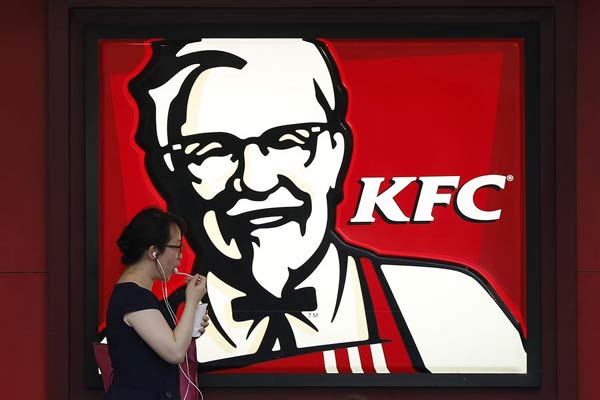 |
|
A customer walks past a KFC store in Shanghai July 22, 2014. [Photo/Agencies] |
The supplier, Husi Food Co, was punished in court earlier this month, but Yum, which owns KFC and Pizza Hut, and McDonald's are still struggling to get over back their business and both are trying to move their image up the food chain.
A facelift is necessary as Chinese diners, like their Western counterparts, are becoming less impressed with fast food, and more health conscious. What's more, the expanding consumer class are increasingly intrigued by originality and Chinese culinary heritage.
McDonald's began testing a 'Create Your Taste' custom burger joint in last year. Diners are encouraged to choose everything from bun and burger to salads and dressings for their own burger.
So far, 11 such custom burger restaurants have opened and there are plans for 150 more this year.
In Beijing, people lined up in front of the electronic kiosk inside the city's first McDonald's CYT restaurant a month after its opening in January.
"I've been waiting in line for more than half an hour," said an office worker in Beijing as he waited in line, "but it's worth the wait to have the burger made my way."
But are such innovations a sign of confidence in the China market, or clutching at straws?
"Despite recent external challenges, we remain confident in the potential of this important market and in the strategy we have in place to expand the brand even further," said McDonald's president and CEO Steve Easterbrook in January. The Golden Arches plans to open more than 250 restaurants in China this year.
"The Husi scandal serves as a wake-up call for these western fast food chains that their brands no long command the same kind of appeal and loyalty they once did," said Zhu Danpeng, a consultant with China Brand Research Institute.
What they are trying, according to Zhu, is to take a step back from the standard fast food processes that made them successful at first, but have now be successfully mimicked by local rivals. Instead, they are turning to customization and table service to deliver a premium experience for diners.
"It's as if they are betraying their fast food roots to be associated with healthy, trendy and fun lifestyles, to appeal to a new generation of consumers," Zhu said.
Yum! Brands' Pizza Hut has followed a similar route. While sales of KFC are slowly creeping back toward pre-scandal levels, Pizza Hut is still struggling. Its first restaurant in downtown Beijing reopened last year, revamped in an attempt to turn the chain's fortunes around.
The new-look Pizza Hut stands out from the other outlets in China with posh furnishing and more original Italian offerings like pro and os.
Yum also announced a plan last year to spin off its China business, which will allow KFC and Pizza Hut to be more flexible in adapting to changes in the China market.
Analysts say it's still early to determine if reinventing themselves will eventually pay off, but they could probably learn from Starbucks, which came to China much later, and found a more premium image appealed China's aspiring middle class.
Starbucks plans to have around 3,400 coffee shops in China by 2019, compared with 2,000 now, including 45 upscale roasteries offering small-lot, single varietal coffee beans.
"We are taking a long term view on how we will build our business in China," CEO Howard Schultz said in January.
"I strongly believe that the government's goal of doubling 2010 per capita income by 2020, resulting in a middle class in China approaching 600 million Chinese people, almost twice the size of the entire current U.S. population, is attainable," he said. "China is here to stay ... and we are just getting started."
